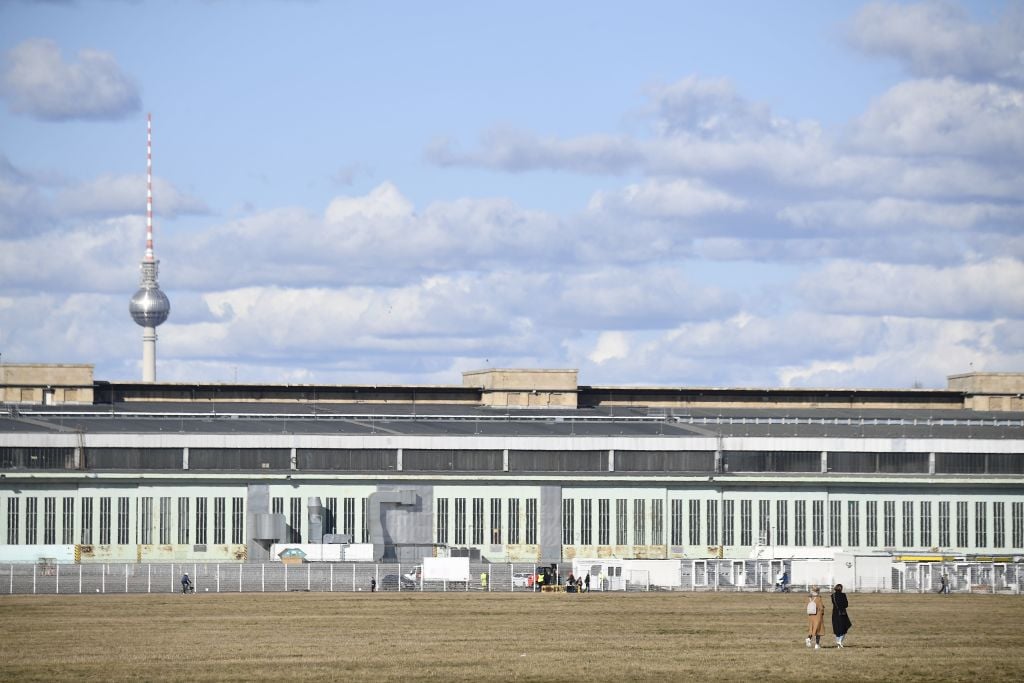
Artists in Berlin are calling for a boycott of a new temporary art space at a historic airport hangar, claiming the venture reflects the interests of its private backers more than the city’s art scene.
The exhibition space, called Kunsthalle Berlin, opened January 28 at the Tempelhof Airport, a facility that was built by the Nazis in 1923 and ceased operations in 2008. A retrospective of work by French artist Bernar Venet—one of the largest ever mounted—inaugurated the space, but it came amid controversy as artists in Berlin, and beyond, refused to support the upstart art project.
Those against the Kunsthalle have taken issue with its backer, the Foundation for Art and Culture, a private art production entity in Bonn, and its founder, curator Walter Smerling, whom opponents say is attempting to parlay cultural influence into political and corporate gain. According to its website, the foundation’s projects are “financed by sponsoring from business or the private sector.”
Boycotting artists have also called out the state for granting the foundation permission to use a pair of the airport’s dormant hangars for the next two years.
“Rather than being a considered initiative that is in the interests of the arts and cultural community of Berlin at large (as you might expect from an institution wielding the name ‘Kunsthalle Berlin’), the new ‘Kunsthalle’ can best be described as a cynical, neoliberal vehicle that will primarily serve to increase the stature and private wealth of all those associated with it,” wrote Berlin-based artist Candice Breitz in a statement ahead of the opening.
“In joining this boycott,” the artist concluded, “we wish to send a clear message: This ‘Kunsthalle’ is not what Berlin artists need. [Nor] is it what most Berlin artists want.”
Zoë Claire Miller and Heidi Sill, representatives of the bbk berlin association of visual artists, also took issue with Smerling’s adoption of the word “Kunsthalle” for the space.
“With the self-appointment as Kunsthalle Berlin, the [Foundation for Art and Culture] from Bonn—which is not a foundation, but an association that pursues its own interests—suggests that the use of the historic Tempelhof airport hangar by this association is publicly legitimized,” the Bbk spokespersons wrote in a press release. “But this is by no means the case.”
“Where is the communication with civil society?” they asked.
Other artists who have publicly supported the boycott online include Adam Broomberg, Antje Majewski, and Tobias Zielony.
“Boycott is not an appropriate response to dialogue and artists boycotting other artists is certainly not something we want,” Smerling told Artnet News in an email. “I’m confident that the upcoming conversations and the reactions to the beautiful Bernar Venet exhibition, showcasing his life’s work, will lead to positive responses from the local art scene.”
“There is never enough space for art,” the curator went on, “and I invite everyone who is seriously interested to see the exhibition and engage in constructive dialogue with us.”
Smerling previously came under fire for “Diversity United,” a blockbuster exhibition about “European values” that opened last year at the Tempelhof Airport and was supported by Vladimir Putin. Critics accused Smerling of not paying participating artists and forming an exclusively white and male advisory council.